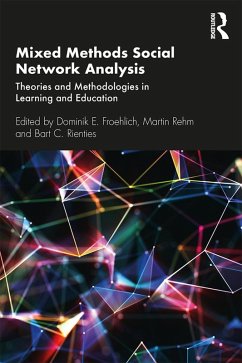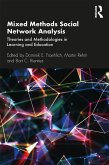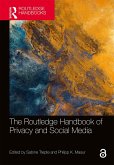Mixed Methods Social Network Analysis (eBook, PDF)
Theories and Methodologies in Learning and Education
Redaktion: Froehlich, Dominik E.; Rienties, Bart C.; Rehm, Martin
48,95 €
48,95 €
inkl. MwSt.
Sofort per Download lieferbar

24 °P sammeln
48,95 €
Als Download kaufen

48,95 €
inkl. MwSt.
Sofort per Download lieferbar

24 °P sammeln
Jetzt verschenken
Alle Infos zum eBook verschenken
48,95 €
inkl. MwSt.
Sofort per Download lieferbar
Alle Infos zum eBook verschenken

24 °P sammeln
Mixed Methods Social Network Analysis (eBook, PDF)
Theories and Methodologies in Learning and Education
Redaktion: Froehlich, Dominik E.; Rienties, Bart C.; Rehm, Martin
- Format: PDF
- Merkliste
- Auf die Merkliste
- Bewerten Bewerten
- Teilen
- Produkt teilen
- Produkterinnerung
- Produkterinnerung

Bitte loggen Sie sich zunächst in Ihr Kundenkonto ein oder registrieren Sie sich bei
bücher.de, um das eBook-Abo tolino select nutzen zu können.
Hier können Sie sich einloggen
Hier können Sie sich einloggen
Sie sind bereits eingeloggt. Klicken Sie auf 2. tolino select Abo, um fortzufahren.

Bitte loggen Sie sich zunächst in Ihr Kundenkonto ein oder registrieren Sie sich bei bücher.de, um das eBook-Abo tolino select nutzen zu können.
This book establishes an informed theoretical and methodological basis for research using Mixed Methods approaches to Social Network Analysis.
- Geräte: PC
- ohne Kopierschutz
- eBook Hilfe
- Größe: 3.36MB
Andere Kunden interessierten sich auch für
![Mixed Methods Social Network Analysis (eBook, ePUB) Mixed Methods Social Network Analysis (eBook, ePUB)]() Mixed Methods Social Network Analysis (eBook, ePUB)48,95 €
Mixed Methods Social Network Analysis (eBook, ePUB)48,95 €![Theories of the Mobile Internet (eBook, PDF) Theories of the Mobile Internet (eBook, PDF)]() Theories of the Mobile Internet (eBook, PDF)49,95 €
Theories of the Mobile Internet (eBook, PDF)49,95 €![Digital Technology and the Future of Broadcasting (eBook, PDF) Digital Technology and the Future of Broadcasting (eBook, PDF)]() Digital Technology and the Future of Broadcasting (eBook, PDF)42,95 €
Digital Technology and the Future of Broadcasting (eBook, PDF)42,95 €![The Routledge Handbook of Privacy and Social Media (eBook, PDF) The Routledge Handbook of Privacy and Social Media (eBook, PDF)]() The Routledge Handbook of Privacy and Social Media (eBook, PDF)46,95 €
The Routledge Handbook of Privacy and Social Media (eBook, PDF)46,95 €![Politics of Gaze (eBook, PDF) Politics of Gaze (eBook, PDF)]() Yasmin IbrahimPolitics of Gaze (eBook, PDF)39,95 €
Yasmin IbrahimPolitics of Gaze (eBook, PDF)39,95 €![The Digital Divide (eBook, PDF) The Digital Divide (eBook, PDF)]() The Digital Divide (eBook, PDF)54,95 €
The Digital Divide (eBook, PDF)54,95 €![The Routledge Reviewer's Guide to Mixed Methods Analysis (eBook, PDF) The Routledge Reviewer's Guide to Mixed Methods Analysis (eBook, PDF)]() The Routledge Reviewer's Guide to Mixed Methods Analysis (eBook, PDF)65,95 €
The Routledge Reviewer's Guide to Mixed Methods Analysis (eBook, PDF)65,95 €-
-
-
This book establishes an informed theoretical and methodological basis for research using Mixed Methods approaches to Social Network Analysis.
Dieser Download kann aus rechtlichen Gründen nur mit Rechnungsadresse in A, B, BG, CY, CZ, D, DK, EW, E, FIN, F, GR, HR, H, IRL, I, LT, L, LR, M, NL, PL, P, R, S, SLO, SK ausgeliefert werden.
Produktdetails
- Produktdetails
- Verlag: Taylor & Francis
- Seitenzahl: 292
- Erscheinungstermin: 9. Dezember 2019
- Englisch
- ISBN-13: 9780429552571
- Artikelnr.: 58388799
- Verlag: Taylor & Francis
- Seitenzahl: 292
- Erscheinungstermin: 9. Dezember 2019
- Englisch
- ISBN-13: 9780429552571
- Artikelnr.: 58388799
- Herstellerkennzeichnung Die Herstellerinformationen sind derzeit nicht verfügbar.
Dominik E. Froehlich is a postdoctoral researcher at the Department of Education at the University of Vienna. His research focuses on mixed methods and social network analysis, as well as on (informal) learning in the workplace. Martin Rehm is a postdoctoral research fellow at the University of Education in Weingarten, Germany. He also holds the position of Transfermanager for the Institute for Educational Consultancy at the same university. Bart C. Rienties leads the Open University's innovative efforts in learning analytics as program director. His research interests include a range of social influences on education, such as collaborative use of educational technology, the role of motivation in learning, and internationalization in higher education.
Foreword
Acknowledgments
1. MMSNA: An Introduction of a Tale of Two Communities Dominik E.
Froehlich, Martin Rehm, and Bart C. Rienties
SECTION 1: Why Do Mixed Methods Social Network Analysis?
2. Mapping Mixed Methods Approaches to Social Network Analysis in Learning
and Education Dominik E. Froehlich
3. Data Collection for Mixed Method Approaches in Social Network Analysis
Manuel Längler, Jasperina Brouwer, and Hans Gruber
4. Integrating Units of Analysis Dominik E. Froehlich, Mathias Mejeh, Sarah
Galey, and Judith Schoonenboom
5. Visual Methods and Representations in Mixed Methods (and) Social Network
Research: A Discussion Peggy Shannon-Baker and Jonathan C. Hilpert
6. Minding the Gap Between Culture and Connectivity: Laying the Foundations
for A Relational Mixed Methods Social Network Analysis Petter Törnberg and
Anton Törnberg
7. Ethnographic Mixed Methods Social Network Analysis Research:
Convergence, Opportunities, and Challenges Marc Sarazin
8. Mixed Methods Social Network Analysis to Drive Organizational
Development Tuire Palonen and Dominik E. Froehlich
9. Identity Development Through Interactions in Social Networks: A Complex
Systems Approach Judith Schoonenboom
SECTION 2: How Do We Do Mixed Methods Social Network Analysis?
10. Social Network Analysis and Activity Theory: A Symbiotic Relationship
Victoria L. Murphy, Allison Littlejohn, and Bart C. Rienties
11. Exploring Social Relationships in "A Mixed Way": Mixed Structural
Analysis Dominik E. Froehlich
12. Unpacking the Collegial Network Structure of Beginning Teachers'
Primary School Teams: A Mixed Method Social Network Study Laura Thomas,
Melissa Tuytens, Geert Devos, Geert Kelchtermans, and Ruben Vanderlinde
13. Around and Around: The Concentric Circles Method as A Powerful Tool to
Collect Mixed Method Network Data Sara Van Waes and Piet Van Den Bossche
14. Reflections About Intersecting Mixed Methods Research with Social
Network Analysis Sinem Toraman and Vicki L. Plano Clark
15. The Role of Knowing and Valuing Others' Expertise in Accelerating
Information Exchange Katerina Bohle Carbonell, Chris Marcum, Karen D.
Könings, Patricia M. Stassen, Mien Segers, and Jeroen Van Merriënboer
16. Is Mixed Methods Social Network Analysis Ethical? Maina Korir, Jenna
Mittelmeier, and Bart C. Rienties
17. Automation and The Journey to Mixed Methods Social Network Analysis
Dominik E. Froehlich, Christoforos Mamas, and Herwig W. Schneider
18. Power to the People?! Twitter Discussions On (Educational) Policy
Processes Martin Rehm, Frank Cornelissen, Ad Notten, Alan Daly, and
Jonathan Supovitz
19. The PRICE of Mixed Methods Social Network Analysis: Toward an Ethical
Process for MMSNA Anthony J. Onwuegbuzie
20. Powers and Limitations of MMSNA: Critical Reflections and Moving
Forward Bart C. Rienties
Index
Acknowledgments
1. MMSNA: An Introduction of a Tale of Two Communities Dominik E.
Froehlich, Martin Rehm, and Bart C. Rienties
SECTION 1: Why Do Mixed Methods Social Network Analysis?
2. Mapping Mixed Methods Approaches to Social Network Analysis in Learning
and Education Dominik E. Froehlich
3. Data Collection for Mixed Method Approaches in Social Network Analysis
Manuel Längler, Jasperina Brouwer, and Hans Gruber
4. Integrating Units of Analysis Dominik E. Froehlich, Mathias Mejeh, Sarah
Galey, and Judith Schoonenboom
5. Visual Methods and Representations in Mixed Methods (and) Social Network
Research: A Discussion Peggy Shannon-Baker and Jonathan C. Hilpert
6. Minding the Gap Between Culture and Connectivity: Laying the Foundations
for A Relational Mixed Methods Social Network Analysis Petter Törnberg and
Anton Törnberg
7. Ethnographic Mixed Methods Social Network Analysis Research:
Convergence, Opportunities, and Challenges Marc Sarazin
8. Mixed Methods Social Network Analysis to Drive Organizational
Development Tuire Palonen and Dominik E. Froehlich
9. Identity Development Through Interactions in Social Networks: A Complex
Systems Approach Judith Schoonenboom
SECTION 2: How Do We Do Mixed Methods Social Network Analysis?
10. Social Network Analysis and Activity Theory: A Symbiotic Relationship
Victoria L. Murphy, Allison Littlejohn, and Bart C. Rienties
11. Exploring Social Relationships in "A Mixed Way": Mixed Structural
Analysis Dominik E. Froehlich
12. Unpacking the Collegial Network Structure of Beginning Teachers'
Primary School Teams: A Mixed Method Social Network Study Laura Thomas,
Melissa Tuytens, Geert Devos, Geert Kelchtermans, and Ruben Vanderlinde
13. Around and Around: The Concentric Circles Method as A Powerful Tool to
Collect Mixed Method Network Data Sara Van Waes and Piet Van Den Bossche
14. Reflections About Intersecting Mixed Methods Research with Social
Network Analysis Sinem Toraman and Vicki L. Plano Clark
15. The Role of Knowing and Valuing Others' Expertise in Accelerating
Information Exchange Katerina Bohle Carbonell, Chris Marcum, Karen D.
Könings, Patricia M. Stassen, Mien Segers, and Jeroen Van Merriënboer
16. Is Mixed Methods Social Network Analysis Ethical? Maina Korir, Jenna
Mittelmeier, and Bart C. Rienties
17. Automation and The Journey to Mixed Methods Social Network Analysis
Dominik E. Froehlich, Christoforos Mamas, and Herwig W. Schneider
18. Power to the People?! Twitter Discussions On (Educational) Policy
Processes Martin Rehm, Frank Cornelissen, Ad Notten, Alan Daly, and
Jonathan Supovitz
19. The PRICE of Mixed Methods Social Network Analysis: Toward an Ethical
Process for MMSNA Anthony J. Onwuegbuzie
20. Powers and Limitations of MMSNA: Critical Reflections and Moving
Forward Bart C. Rienties
Index
Foreword
Acknowledgments
1. MMSNA: An Introduction of a Tale of Two Communities Dominik E.
Froehlich, Martin Rehm, and Bart C. Rienties
SECTION 1: Why Do Mixed Methods Social Network Analysis?
2. Mapping Mixed Methods Approaches to Social Network Analysis in Learning
and Education Dominik E. Froehlich
3. Data Collection for Mixed Method Approaches in Social Network Analysis
Manuel Längler, Jasperina Brouwer, and Hans Gruber
4. Integrating Units of Analysis Dominik E. Froehlich, Mathias Mejeh, Sarah
Galey, and Judith Schoonenboom
5. Visual Methods and Representations in Mixed Methods (and) Social Network
Research: A Discussion Peggy Shannon-Baker and Jonathan C. Hilpert
6. Minding the Gap Between Culture and Connectivity: Laying the Foundations
for A Relational Mixed Methods Social Network Analysis Petter Törnberg and
Anton Törnberg
7. Ethnographic Mixed Methods Social Network Analysis Research:
Convergence, Opportunities, and Challenges Marc Sarazin
8. Mixed Methods Social Network Analysis to Drive Organizational
Development Tuire Palonen and Dominik E. Froehlich
9. Identity Development Through Interactions in Social Networks: A Complex
Systems Approach Judith Schoonenboom
SECTION 2: How Do We Do Mixed Methods Social Network Analysis?
10. Social Network Analysis and Activity Theory: A Symbiotic Relationship
Victoria L. Murphy, Allison Littlejohn, and Bart C. Rienties
11. Exploring Social Relationships in "A Mixed Way": Mixed Structural
Analysis Dominik E. Froehlich
12. Unpacking the Collegial Network Structure of Beginning Teachers'
Primary School Teams: A Mixed Method Social Network Study Laura Thomas,
Melissa Tuytens, Geert Devos, Geert Kelchtermans, and Ruben Vanderlinde
13. Around and Around: The Concentric Circles Method as A Powerful Tool to
Collect Mixed Method Network Data Sara Van Waes and Piet Van Den Bossche
14. Reflections About Intersecting Mixed Methods Research with Social
Network Analysis Sinem Toraman and Vicki L. Plano Clark
15. The Role of Knowing and Valuing Others' Expertise in Accelerating
Information Exchange Katerina Bohle Carbonell, Chris Marcum, Karen D.
Könings, Patricia M. Stassen, Mien Segers, and Jeroen Van Merriënboer
16. Is Mixed Methods Social Network Analysis Ethical? Maina Korir, Jenna
Mittelmeier, and Bart C. Rienties
17. Automation and The Journey to Mixed Methods Social Network Analysis
Dominik E. Froehlich, Christoforos Mamas, and Herwig W. Schneider
18. Power to the People?! Twitter Discussions On (Educational) Policy
Processes Martin Rehm, Frank Cornelissen, Ad Notten, Alan Daly, and
Jonathan Supovitz
19. The PRICE of Mixed Methods Social Network Analysis: Toward an Ethical
Process for MMSNA Anthony J. Onwuegbuzie
20. Powers and Limitations of MMSNA: Critical Reflections and Moving
Forward Bart C. Rienties
Index
Acknowledgments
1. MMSNA: An Introduction of a Tale of Two Communities Dominik E.
Froehlich, Martin Rehm, and Bart C. Rienties
SECTION 1: Why Do Mixed Methods Social Network Analysis?
2. Mapping Mixed Methods Approaches to Social Network Analysis in Learning
and Education Dominik E. Froehlich
3. Data Collection for Mixed Method Approaches in Social Network Analysis
Manuel Längler, Jasperina Brouwer, and Hans Gruber
4. Integrating Units of Analysis Dominik E. Froehlich, Mathias Mejeh, Sarah
Galey, and Judith Schoonenboom
5. Visual Methods and Representations in Mixed Methods (and) Social Network
Research: A Discussion Peggy Shannon-Baker and Jonathan C. Hilpert
6. Minding the Gap Between Culture and Connectivity: Laying the Foundations
for A Relational Mixed Methods Social Network Analysis Petter Törnberg and
Anton Törnberg
7. Ethnographic Mixed Methods Social Network Analysis Research:
Convergence, Opportunities, and Challenges Marc Sarazin
8. Mixed Methods Social Network Analysis to Drive Organizational
Development Tuire Palonen and Dominik E. Froehlich
9. Identity Development Through Interactions in Social Networks: A Complex
Systems Approach Judith Schoonenboom
SECTION 2: How Do We Do Mixed Methods Social Network Analysis?
10. Social Network Analysis and Activity Theory: A Symbiotic Relationship
Victoria L. Murphy, Allison Littlejohn, and Bart C. Rienties
11. Exploring Social Relationships in "A Mixed Way": Mixed Structural
Analysis Dominik E. Froehlich
12. Unpacking the Collegial Network Structure of Beginning Teachers'
Primary School Teams: A Mixed Method Social Network Study Laura Thomas,
Melissa Tuytens, Geert Devos, Geert Kelchtermans, and Ruben Vanderlinde
13. Around and Around: The Concentric Circles Method as A Powerful Tool to
Collect Mixed Method Network Data Sara Van Waes and Piet Van Den Bossche
14. Reflections About Intersecting Mixed Methods Research with Social
Network Analysis Sinem Toraman and Vicki L. Plano Clark
15. The Role of Knowing and Valuing Others' Expertise in Accelerating
Information Exchange Katerina Bohle Carbonell, Chris Marcum, Karen D.
Könings, Patricia M. Stassen, Mien Segers, and Jeroen Van Merriënboer
16. Is Mixed Methods Social Network Analysis Ethical? Maina Korir, Jenna
Mittelmeier, and Bart C. Rienties
17. Automation and The Journey to Mixed Methods Social Network Analysis
Dominik E. Froehlich, Christoforos Mamas, and Herwig W. Schneider
18. Power to the People?! Twitter Discussions On (Educational) Policy
Processes Martin Rehm, Frank Cornelissen, Ad Notten, Alan Daly, and
Jonathan Supovitz
19. The PRICE of Mixed Methods Social Network Analysis: Toward an Ethical
Process for MMSNA Anthony J. Onwuegbuzie
20. Powers and Limitations of MMSNA: Critical Reflections and Moving
Forward Bart C. Rienties
Index







